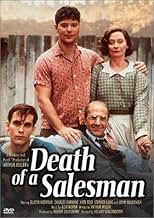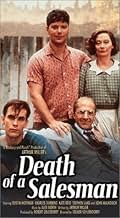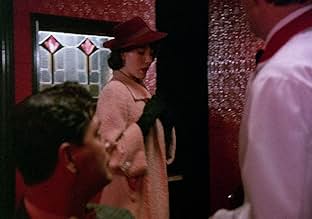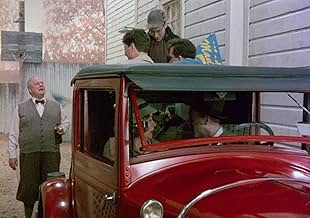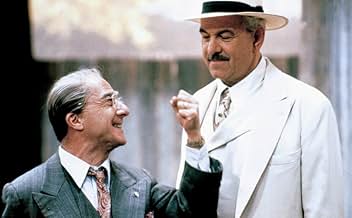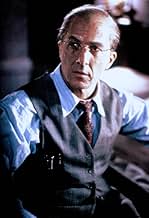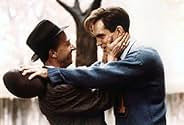IMDb-BEWERTUNG
7,2/10
12.196
IHRE BEWERTUNG
Füge eine Handlung in deiner Sprache hinzuAn aging traveling salesman recognizes the emptiness of his life and tries to fix it.An aging traveling salesman recognizes the emptiness of his life and tries to fix it.An aging traveling salesman recognizes the emptiness of his life and tries to fix it.
- 3 Primetime Emmys gewonnen
- 7 Gewinne & 12 Nominierungen insgesamt
David Chandler
- Bernard
- (as David S. Chandler)
Kathryn Rossetter
- Woman from Boston
- (as Kathy Rossetter)
Empfohlene Bewertungen
A generation after Lee J. Cobb originated the role on stage and Fredric March did
the big screen version, Dustin Hoffman does a really great job as Willy Loman in
Death Of A Salesman in a made for television version. It's a bit more surreal than
the others but Arthur Miller's message about misplaced values certainly gets
across.
All poor Willy Loman wanted to be was be liked and that to him became a creed. It's how you sell your product, it's how you sell yourself. He loved his family, but he was always 'on'. And forever envious of brother Ben who went out and took risks but saw the world.
Hoffman was years younger than March or Cobb, but with makeup he certainly looks the part. Kate Reid plays the wife and John Malkovich and Stephen Lang are sons Biff and Hap. They really function well as the Loman family unit and the chemistry is real.
Seeing how much purchasing is now done on line, I wonder if a lot of the message of Death Of A Salesman will be lost in the future. An audience in the future might not know what a salesman is or does as personal contact in buying and selling becomes less and less.
I certainly hope not.
All poor Willy Loman wanted to be was be liked and that to him became a creed. It's how you sell your product, it's how you sell yourself. He loved his family, but he was always 'on'. And forever envious of brother Ben who went out and took risks but saw the world.
Hoffman was years younger than March or Cobb, but with makeup he certainly looks the part. Kate Reid plays the wife and John Malkovich and Stephen Lang are sons Biff and Hap. They really function well as the Loman family unit and the chemistry is real.
Seeing how much purchasing is now done on line, I wonder if a lot of the message of Death Of A Salesman will be lost in the future. An audience in the future might not know what a salesman is or does as personal contact in buying and selling becomes less and less.
I certainly hope not.
I had to read Arthur Miller's Death of a Salesman` for my English class this year. Our teacher was a very industrious woman and let us analyze every character's every word several times, until we couldn't hear the words Willy`, Linda`, Biff`, American Dream` and stockings` any more. It was terrible! She didn't show us any theater or film version, so we began to utterly dislike the text as a whole: a sentimental play where you already know the ending when you read the title.
A few days ago, I spotted Volker Schlöndorff's film version on television, a German dubbed version, but that doesn't matter because I already knew the lines and Schlöndorff hardly changed them.
Fortunately, Schlöndorff didn't make any effort to put his own special style into the movie, he just left the play the way it was and the way, I suppose, Arthur Miller wanted it. So some of you might claim that this version was too stage-drama-like, not cinematic. For me, this was ideal because I could see the REAL, lively Death of a Salesman`, played by an ideal cast: Dustin Hoffman: a little over-acting, but enthusisiastic; Kate Reid: so authentic that she could be taken for my mother; John Malkovich: silent, thoughtful, self-confident`, great! How shall I put it? This film sort of opened my eyes towards this great, merciless work of Arthur Miller. This play is something you can orientate your life to. At many important turning points of your life, you can remember Willy Loman and his fate that is fictitious but and believe me, I know some people who are exactly like him definitely could be the fate of a real person, and not only of an American. I found the Salesman` important, not as much as a criticism of the American Dream but an account of what must happen, if lives are built upon lies lies to others and lies to yourself. Those people who think Death of a Salesman` is rubbish are those who suppress cruel truths just as Willy Loman does.
So, when I saw this movie, I was completely stunned because its hopelessness became clear to me and I noticed how crucial this American classic really is. I give Schlöndorff 8 out of 10 stars because there are some flaws in his way of directing (e. g. letting Malkovich and Lang play their young alter egos was stupid because no one believes that they are 17).
Another sad example how bad teachers can destroy a masterpiece. Shame on you, Mrs. H.!
A few days ago, I spotted Volker Schlöndorff's film version on television, a German dubbed version, but that doesn't matter because I already knew the lines and Schlöndorff hardly changed them.
Fortunately, Schlöndorff didn't make any effort to put his own special style into the movie, he just left the play the way it was and the way, I suppose, Arthur Miller wanted it. So some of you might claim that this version was too stage-drama-like, not cinematic. For me, this was ideal because I could see the REAL, lively Death of a Salesman`, played by an ideal cast: Dustin Hoffman: a little over-acting, but enthusisiastic; Kate Reid: so authentic that she could be taken for my mother; John Malkovich: silent, thoughtful, self-confident`, great! How shall I put it? This film sort of opened my eyes towards this great, merciless work of Arthur Miller. This play is something you can orientate your life to. At many important turning points of your life, you can remember Willy Loman and his fate that is fictitious but and believe me, I know some people who are exactly like him definitely could be the fate of a real person, and not only of an American. I found the Salesman` important, not as much as a criticism of the American Dream but an account of what must happen, if lives are built upon lies lies to others and lies to yourself. Those people who think Death of a Salesman` is rubbish are those who suppress cruel truths just as Willy Loman does.
So, when I saw this movie, I was completely stunned because its hopelessness became clear to me and I noticed how crucial this American classic really is. I give Schlöndorff 8 out of 10 stars because there are some flaws in his way of directing (e. g. letting Malkovich and Lang play their young alter egos was stupid because no one believes that they are 17).
Another sad example how bad teachers can destroy a masterpiece. Shame on you, Mrs. H.!
Volker Schlondorff's adaptation of Arthur Miller's bed-rock of an American tragedy, Death of a Salesman, is one of the best made-for-TV movies of the 80's (odd how it never got a theatrical release though). It gives the star power of Dustin Hoffman in the iconic role of Willy Loman, and for a great theater actor-turned-screen star (though mostly low-key through his career), John Malkovich, and some fine character acting as well. If you've read the play, you might envision something else entirely, and if you've seen it on stage it might bring more disappointment. It is the sort of play you end up going through whether you want to or not in English class(es), particularly in college. It is an important film to see/play to read when you're around this age bracket, as the struggles of Willy and Biff collide alongside each other, and some kind of catharsis needs to come for both- one who's life has almost gone up in smoke, and one who needs to figure it out.
It's not worth talking about much of the actual plot or story of the film/play, although it is of note that one of the very best (or at least most effective) scenes for me comes when Willy visits Howard at the office. This exchange, and the drama that unfolds, is a truly heart-breaking little moment, among some others in the film, where you see a collision of "old-school" salesmanship and the always now recycling form of BS that goes with the salesman/business world. Really, what's worth talking about is the acting, and certain things with the style, for if you are wanting to check out the film before (or after) seeing the play, it's worth it to know what you'll be in for. In short, Hoffman is quite powerful and true in the film, though in ways that aren't really expectable.
An image from reading the play of Willy (that he might be bigger than life, though perhaps little in the mind, and out of shape) might go against a low-energy actor like Hoffman. But somehow, it seems to work, because there's heart and fire in the performance. Same goes for Malkovich, though on a different level. Their scenes together, or on their own, are like watching pro boxers have a go at each other, old timer versus a new champ; there is one other scene, when Biff catches Willy in the hotel room with his 'lady friend' that is likely one of the best scenes either actor has ever done (even if it's questionable if overall the performances are among their best).
As far as stylistics go, Schlondorff usually does the right thing: let these actors have their way around, and just try to film it without too much getting in the way. He does this, and at the same time is clever with certain camera sweeps and timing in the narrative (Miller's play was one of the first to jump around, like a novel or even a some films). The music by Alex North is one of my least favorite aspects to th film, as it chimes in some emotional cues that aren't right at all (though when it gets to the jazzy 40's style music then it's not bad). This version of Death of a Salesman is definitely recommended by me, but it may not be the absolute definitive version for some.
It's not worth talking about much of the actual plot or story of the film/play, although it is of note that one of the very best (or at least most effective) scenes for me comes when Willy visits Howard at the office. This exchange, and the drama that unfolds, is a truly heart-breaking little moment, among some others in the film, where you see a collision of "old-school" salesmanship and the always now recycling form of BS that goes with the salesman/business world. Really, what's worth talking about is the acting, and certain things with the style, for if you are wanting to check out the film before (or after) seeing the play, it's worth it to know what you'll be in for. In short, Hoffman is quite powerful and true in the film, though in ways that aren't really expectable.
An image from reading the play of Willy (that he might be bigger than life, though perhaps little in the mind, and out of shape) might go against a low-energy actor like Hoffman. But somehow, it seems to work, because there's heart and fire in the performance. Same goes for Malkovich, though on a different level. Their scenes together, or on their own, are like watching pro boxers have a go at each other, old timer versus a new champ; there is one other scene, when Biff catches Willy in the hotel room with his 'lady friend' that is likely one of the best scenes either actor has ever done (even if it's questionable if overall the performances are among their best).
As far as stylistics go, Schlondorff usually does the right thing: let these actors have their way around, and just try to film it without too much getting in the way. He does this, and at the same time is clever with certain camera sweeps and timing in the narrative (Miller's play was one of the first to jump around, like a novel or even a some films). The music by Alex North is one of my least favorite aspects to th film, as it chimes in some emotional cues that aren't right at all (though when it gets to the jazzy 40's style music then it's not bad). This version of Death of a Salesman is definitely recommended by me, but it may not be the absolute definitive version for some.
Superb portrayal of tragic characters. One can sense the futility, frustration, and disappointment of Loman. As we age and our faculties deteriorate along with unrealized dreams, it is easy to grasp for hope even where none exists and transfer our aspirations to the next generation only to have them carry your faults and failings in addition to their own. Profoundly sad but unfortunately that is the reality for countless billions of the human race. 8/10.
This TV adaptation of Arthur Miller's most successful play benefits from the serious playing of Dustin Hoffman in the lead as failing salesman Willy Loman. Miller's play takes the plight of the common man within the confines of the 'American dream' and then kicks him down.
Loman's sons are played by John Malkovich (Biff, memorable) and Stephen Lang (Happy, irritating); while his wife is played with tact and resignation by Kate Reid.
The stagey feel of this production comes across in every scene (the famous ones especially with Howard, Loman's boss; and Bernard, the successful son of Loman's colleague; and the final scenes with Linda) although they are handled very well. It would be a temptation to dismiss Willy Loman as loopy and in the throes of a breakdown and to ignore everything he says, but his words strike a chord and stay with you. 'Death of a Salesman' still has something to say to us, and a warning to give, even six decades after it was written.
Loman's sons are played by John Malkovich (Biff, memorable) and Stephen Lang (Happy, irritating); while his wife is played with tact and resignation by Kate Reid.
The stagey feel of this production comes across in every scene (the famous ones especially with Howard, Loman's boss; and Bernard, the successful son of Loman's colleague; and the final scenes with Linda) although they are handled very well. It would be a temptation to dismiss Willy Loman as loopy and in the throes of a breakdown and to ignore everything he says, but his words strike a chord and stay with you. 'Death of a Salesman' still has something to say to us, and a warning to give, even six decades after it was written.
Wusstest du schon
- WissenswertesDustin Hoffman called this his favorite acting experience.
- PatzerWhen Willy comes out of his flashback in the bathroom of Frank's Chop House, the close up shot shows a drink on the toilet seat. When the shot shifts behind the entering waiter, the drink is gone.
- Zitate
Biff Loman: I run out of that building and I see... the sky. I see all the things I love in this world. The work, the food, the time to sit and smoke. And I look at this pen and I ask myself, "What the hell am I grabbing this thing for? Why am I trying to become something I don't wanna become when all I want is out there waiting for me the minute I say I know who I am?"
- VerbindungenFeatured in American Masters: Arthur Miller: Private Conversations (1985)
Top-Auswahl
Melde dich zum Bewerten an und greife auf die Watchlist für personalisierte Empfehlungen zu.
Details
- Erscheinungsdatum
- Herkunftsland
- Offizieller Standort
- Sprache
- Auch bekannt als
- Death of a Salesman
- Drehorte
- Produktionsfirmen
- Weitere beteiligte Unternehmen bei IMDbPro anzeigen
Zu dieser Seite beitragen
Bearbeitung vorschlagen oder fehlenden Inhalt hinzufügen

Oberste Lücke
By what name was Der Tod eines Handlungsreisenden (1985) officially released in Canada in English?
Antwort

